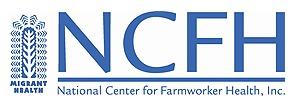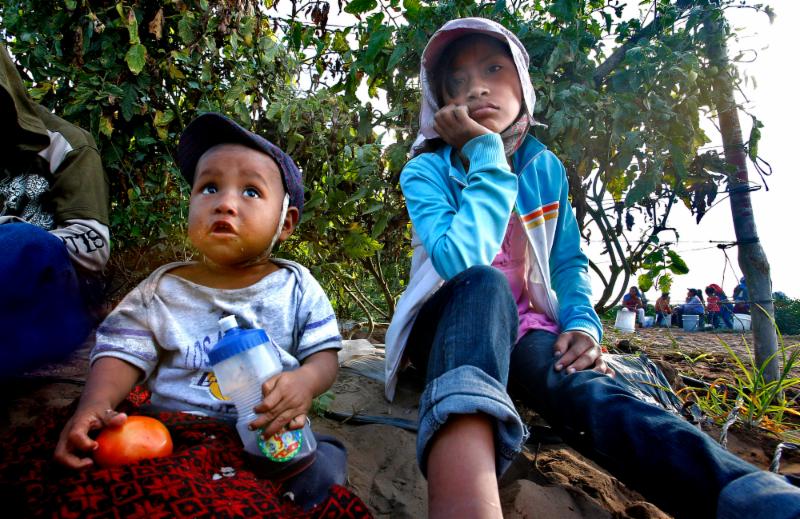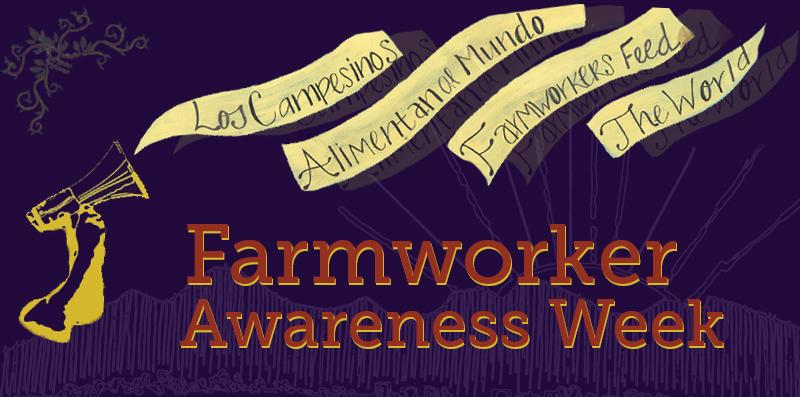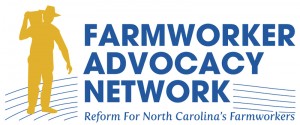Using Digital Stories as Health Education Tools
On May 17, 2017 the National Center for Farmworker Health will host a webinar titled, "Using Digital Stories as Health Education Tools." Using the power of story, presenters will show how health and health care professionals can engage patients and community members into taking an active role in learning about various health issues through inspiration, insight, and critical reflection.
Register here.
|
Migrant Children in the Field
La Cosecha follows the stories of children who work 12 to 14 hours per day, 7 days a week in the fields picking the food that we eat everyday. Every year, more than 400,000 migrant child farm workers in the US travel from the Texas onion fields to the Michigan apple orchards, from the Florida tomato fields to the cherry trees in Oregon. This film follows three of them through the 2009-10 harvests.
|
Click here to view an
infographic that highlights the daily struggles that seasonal and migrant farmworkers face.

is a nonprofit corporation dedicated to improving the health status of farmworker families. By providing information services, training and technical assistance, and a variety of products to community and migrant health centers, organizations, universities, researchers, and individuals involved in farmworker health, they support the empowerment of farmworker communities.
The
Migrant Clinicians Network is a nonprofit organization that creates practical solutions at the intersection of poverty, migration, and health. They provide case management, support, technical assistance, and professional development to clinicians in Federally Qualified Health Centers (FQHCs) and other health care delivery sites. Their purpose is to provide quality health care reduces disparities for migrant farmworkers and other mobile underserved populations.
Farmworker Justice is a nonprofit organization that seeks to empower migrant and seasonal farmworkers to improve their living and working conditions, immigration status, health, occupational safety, and access to justice. This non-profit organization works with farmworkers and organizations that support them nationally.
The
National Farm Worker Ministry (NFWM) is a faith-based organization that supports farmworkers as they organize for justice and empowerment. NFWM brings together national denominations, state councils of churches, religious orders and congregations, and concerned individuals to act with farmworkers to achieve change in their living and working conditions.

Student Action with Farmworkers (SAF)
is a non-profit organization whose mission is to bring students and farmworkers together to learn about each other's lives, share resources and skills, improve conditions for farmworkers, and build diverse coalitions working for social change. SAF works with farmworkers, students, and advocates in the Southeast and nationwide to create a more just agricultural system.
to honor the contributions of farmworkers and to raise awareness about farmworker conditions.
 North Carolina Farmworker Health Program (NCFHP), housed within the NC Office of Rural Health, is a statewide Migrant Health Voucher Program that works to better the health of migrant and seasonal farmworkers and their families. The program provides funding, technical assistance, and training to a statewide network of outreach and health care providers. As opposed to a free-standing health center, NCFHP works with local agencies to respond to gaps in health care that would otherwise prevent farmworkers from accessing needed care.
North Carolina Farmworker Health Program (NCFHP), housed within the NC Office of Rural Health, is a statewide Migrant Health Voucher Program that works to better the health of migrant and seasonal farmworkers and their families. The program provides funding, technical assistance, and training to a statewide network of outreach and health care providers. As opposed to a free-standing health center, NCFHP works with local agencies to respond to gaps in health care that would otherwise prevent farmworkers from accessing needed care.
|
|
 |
|
Farmworker Health -- Women & Children in the Field
Although the exact number is uncertain, it is estimated that hundreds of thousands of children under the age of 18
work in the agricultural industry in any given year. It is also estimated that 3.5 million migrant and seasonal farmworkers are women, approximately 17% of which are of childbearing age (15-44 years). Of the women who are also mothers, it is estimated that 97% of them are accompanied by their children. On a daily basis, the w
omen and children working in the agricultural industry confront a wide range of health concerns.
A major occupational risk associated with this line of work includes
lack of access to potable water. This lack of clean water can lead to gastrointestinal infections from drinking contaminated water. While hazardous to men and women alike, these sorts of infections are particularly
harmful for pregnant women and their children. For many migrant workers, living in substandard housing conditions, including those that are overcrowded, without clean facilities for food preparation, bathing after work, and washing laundry can also lead to the rapid spread infectious diseases.
Many farmworkers are also
regularly exposed to toxic chemicals as a result of directly dealing with pesticides or pesticide-covered crops. These chemicals have lasting effects on their dermatological, neurological, and gastrointestinal systems. Even after leaving the field, workers bring these pesticides into the home, exposing others -- including their spouses and children -- to the same noxious chemicals.
Seasonal and migrant farmworker women and girls in the United States also face a
high risk of sexual violence and harassment in their workplaces. R
ape, stalking, unwanted touching, exhibitionism, or vulgar and obscene language by supervisors, employers, and others in positions of power is not uncommon,
exposing the need not only for health and mental health care, but also civil, criminal, and immigration legal services.
With these various health concerns that women and children confront in the field, access to quality health care is crucial. However, multiple barriers make accessing care challenging, if not impossible.
Lack of transportation has been known to deter many individuals and families from accessing health care. For farmworkers, having unreliable or no transportation makes seeing a health care provider nearly impossible, as many farms are located in remote, rural areas. Even with transportation, farmworkers often do not receive paid time off, which means that a trip to the doctor's office could cost half a day's wages for time away from the farm. Another issue to consider is health insurance. Farmworkers who lack health insurance are less able to afford health care.

Language barriers can also act as an obstacle to accessing health care. Farmworkers who speak a native language other than English have been known to confront challenges to accessing and comprehending health care. In North Carolina, approximately 10-15% of migrant farmworkers speak a native language other than Spanish or English. Because not all health delivery sites have adequate Spanish language resources, let alone the capacity for other languages, farmworkers speaking other native languages are further isolated.
Call to action
In our
current political climate, being a seasonal or migrant farmworker can be scary, particularly for
undocumented workers and their families. As an individual or an organization, you can support one or more of the many organizations that work to raise awareness and advance the basic human rights of farmworkers throughout the U.S. See the resources below and to the left to find ways to get involved.
|
Farmworker Awareness Week!
March 24-31, 2017

The 18th Annual National Farmworker Awareness Week (NFAW) is a week of action for students and community members to raise awareness about farmworker issues on their campuses and in their communities. In 2017 we celebrate this week to raise awareness about farmworker conditions and to honor their important contributions to us every day!
|
Farmworker Resources
The North Carolina Justice Center's
Workers' Rights Project strives to enforce and expand policies that ensure safe workplaces, fair treatment, a living wage, and a strong safety net in times of hardship for all workers, including migrant workers.
 The
Farmworker Advocacy Network (FAN) is a statewide network of organizations that work to improve the working and living conditions of farmworkers and poultry workers in North Carolina. Their work has resulted in improved farmworker housing conditions, pesticide safety, and wages.
 Texas RioGrande Legal Aid (TRLA)
Texas RioGrande Legal Aid (TRLA) is a non-profit organization that provides free legal services to low-income residents in Southwest Texas, and represents migrant and seasonal farmworkers throughout Texas and six other southern states: Kentucky, Tennessee, Alabama, Mississippi, Louisiana, and Arkansas. The
Farmworker Unit of Legal Aid of North Carolina provides quality legal services for seasonal and migrant farmworkers in this state.
|
| Have Thoughts to Share? Write For Our Blog! Do you know seasonal or migrant farmworkers? Do you work with them? Tell us about the successes and challenges you've witnessed.
We'd love to here from you! Share your thoughts by writing for our blog. Click here for more information. |
|
Stay Connected!


|
|
|